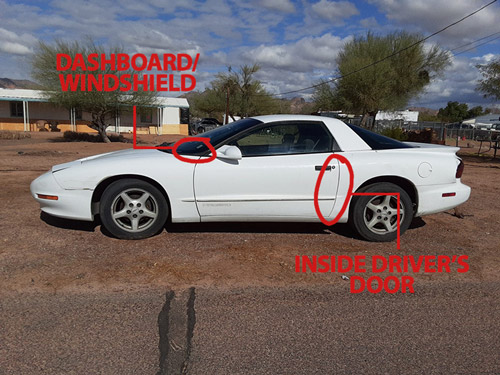A Vehicle Identification Number (VIN) is a 17-character code that acts as a vehicle’s unique ID. No two vehicles share the same VIN. This code stores key details about the vehicle’s origin, build, and history. We use it to check specs, ownership records, and damage reports before buying junk cars.
What Does a VIN Do?
A VIN identifies a specific vehicle across databases.
The VIN tells you the vehicle’s brand, year, country of origin, engine type, body style, and more. It’s like a fingerprint for your car. Law enforcement, buyers, insurers, and junkyards all use VINs to look up the car’s full history.
- Detect past accidents and flood damage
- Verify recalls and safety issues
- Confirm ownership and title status
- Track stolen or salvaged vehicles
- Appraise junk car value accurately
Where Do You Find the VIN?
You find the VIN printed or etched on several parts of the vehicle. The most common spot is on the driver’s side dashboard near the windshield. You can also check:
- Driver’s side door frame
- Engine block
- Under the hood
- Trunk or spare tire area
- Vehicle title
- Registration card
- Insurance documents
- Repair receipts
We always verify the VIN in person before giving a junk car quote.

What If the VIN Is Not 17 Characters?
A VIN with fewer than 17 characters means the car was built before 1981. These VINs may not decode fully on modern tools, but we can still value the car with limited data.
What to do if the VIN is short:
- Double-check for typos
- Look for alternate VIN locations
- Contact the DMV for help
- Provide photos when selling the car
How Is a VIN Decoded?
Each digit in a VIN shows specific vehicle information. The 17 characters are split into sections. Each section means something about the car’s origin, features, or production.
| Position | Code Sample | Meaning |
|---|---|---|
| 1 | 1 | Country (1 = USA) |
| 2-3 | HG | Manufacturer (HG = Honda) |
| 4-8 | CM826 | Model, engine, body type |
| 9 | X | Check digit (validates VIN) |
| 10 | A | Model year (A = 2010) |
| 11 | 5 | Factory location |
| 12-17 | 123456 | Vehicle’s serial number |
What Can You Learn From a VIN Lookup?
A VIN lookup gives access to the full background of the vehicle. We decode the VIN to check for accidents, repairs, odometer rollbacks, title brands, and ownership history.
- Number of past owners
- Salvage or rebuilt titles
- Reported accidents
- Lien and loan status
- Maintenance records
- Open recalls
Who Uses VIN Decoder Services?
Many people and businesses use VIN decoders daily.
- Individual buyers
- Junk car buyers (like us)
- Insurance adjusters
- Law enforcement
- State DMVs
- Auto auction companies
Why VINs Matter When Selling a Junk Car
The VIN affects how much money you get for your junk vehicle. We use your VIN to confirm your car’s specs and damage history. This helps us give accurate offers and prevents fraud.
- Confirm your vehicle matches your title
- Detect tampered or illegal cars
- Price your junk car correctly
- Speed up the quote and removal process
How We Use the VIN at Junk Car Medics
We run every VIN through multiple databases before buying a car. Our goal is to provide fair and accurate quotes fast.
- You provide your VIN during the quote
- We decode the VIN to confirm specs
- We check the car’s history
- We make you an offer
- We schedule free pickup
No VIN? We can still help. Just contact us.
VIN Decoder Example (Suggested Visual)
Example VIN: 1HGCM82633A004352
| 1 | H | G | C | M | 8 | 2 | 6 | 3 | 3 | A | 0 | 0 | 4 | 3 | 5 | 2 |
|---|---|---|---|---|---|---|---|---|---|---|---|---|---|---|---|---|
|Country|Make|Check|Series/Specs|Year|Factory|Serial Number |
The VIN helps us give you a fair and fast offer. Before you junk your car, find your VIN and share it with us. It gives us the data we need to appraise your vehicle right. It also protects you from scams and makes the process smooth.
Junk Car Medics pays cash for vehicles in any condition. We serve all 50 states and offer free towing. Start by giving us your VIN, and we’ll handle the rest.

